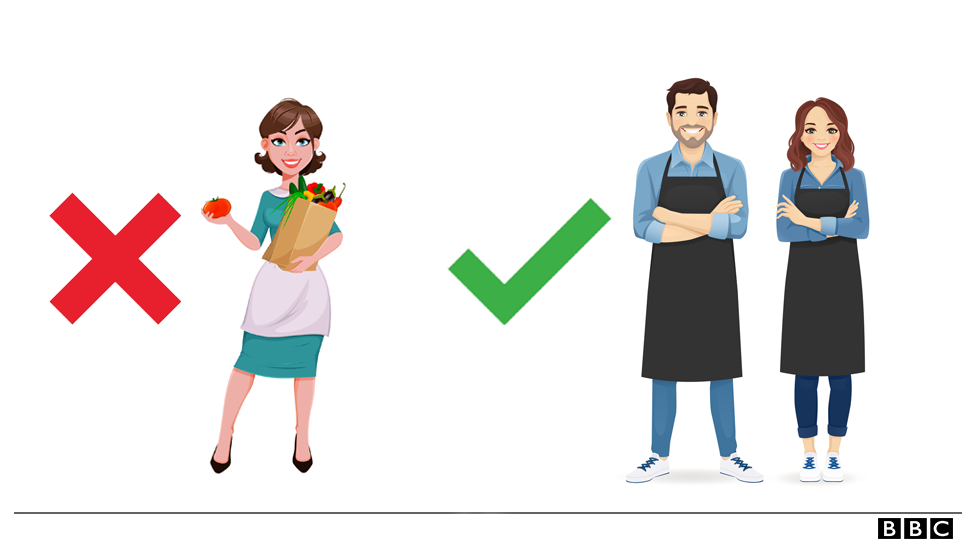Sexism: Can my employer make me wear make-up and heels?
- Published

Racing driver Leanne Holder says there are problems with uniforms being designed for men's bodies
Many workers still deal with sexism in the workplace because of the clothing they have to wear, unions have said.
It comes after Norway was fined 1,500 euros (£1,295) for wearing shorts instead of bikini bottoms at the European Beach Handball Championships.
But what about other sectors and industries?
Sexism in workplace uniforms was banned in 2018, but the Trades Union Congress (TUC) and Unison say it can still be a problem.
So what can your employer ask you to wear?
Requiring women to wear high heels could be unlawful "with all the discomfort and inherent health issues these can cause, because it treats women less favourably than men", according to government guidance, external.
Dress codes for men and women do not have to be identical, but where a rule exists for one sex, the standards imposed on the other should be equal.
Natasha Davies from gender equality charity Chwarae Teg said: "This latest story [Norway] highlights yet again the sexism and inequality that women continue to face.
"Whether it's a requirement to wear a skirt, high heels or make-up, or a lack of appropriate PPE that fits, women continue to be disadvantaged by outdated attitudes in the workplace.
"While there are some legal protections in place, the onus remains on the individual to take action and potentially take an employer to tribunal, which can be a costly experience."
When workwear is designed for men
The TUC and Unison highlighted problems with uniforms not being designed to fit women's bodies.
Leanne Holder, owner of automotive business BecauseRacecarBox and a competitor in Formula Woman, said there have been problems with clothing in male-dominated industries, such as racing suits not fitting properly.
Ms Holder, 28, from Narberth in Pembrokeshire, said: "Unfortunately the motorsport and automotive industries are still male-dominated despite there being some amazing women stepping up and competing against the men.
"With racing equipment only just being tailored towards the female shape, it is apparent that we have a long way to go when it comes to creating complete equality within the sport.

Leanne Holder said the first racing suit to fit women has only recently been designed
"Having racing suits that are baggy, the Velcro not being able to be pulled in enough at the waist and not a lot of room for breasts can be really off-putting when wanting to concentrate on the racing and not on discomfort."
Ms Holder said one racing suit for women has recently been designed, but otherwise they have worn men's suits in smaller sizes.
"I do think concerns get taken seriously, more so in the last few years, however I do think that there is a lot to do still to change the stigma and prejudgements surrounding female drivers and there is a lot more to be spoken about within the gender differences within motorsport."
Rhianydd Williams, equality officer for Wales TUC, added: "We've done a lot of work on the menopause and uniform comes up quite a bit there, often manmade fabrics are hot, can make the wearer feel sweaty and are generally not suitable.
"One of the workplace recommendations that our union reps have made is to change staff uniform to a natural fibre.
"Another aspect is hair workplace policies, there are some department stores where there are hair codes, this disproportionately affects black women, who are not allowed to wear their hair naturally to work."
Unison highlighted that uniforms should be designed specifically for pregnant women, saying "there's a world of difference between something designed for a pregnant woman and just bigger clothes".
Ill-fitting equipment can even become dangerous, such as in the case of Personal Protective Equipment (PPE).

In a video posted on Twitter, one doctor joked about having "a small head" for PPE
Unison said much of the PPE sourced at the beginning of the pandemic was modelled on white males "meaning that it was unlikely to be as reliable" for women.
Jane Gebbie from Unison said: "That is unforgiveable and shows how skewed society is towards men, even in those sectors where employees are overwhelmingly female."
Can employers ask men and women to wear different clothes?
Yes, but if a standard is placed on one sex, an equivalent standard must also exist for the other.
Ms Williams said: "In 2008 a male police officer challenged a dress code. It said that ponytails were not allowed so he wore his hair in a slicked back bun and was told that he must cut it off.
"He argued that he was being treated less favourably that a woman who was allowed to wear her hair in this way and argued discrimination on the basis of sex. He won his case.

Dress codes don't have to be identical for both sexes, but they cannot treat one less favourably
"So in the case of the Olympics, wearing bikini bottoms is far more likely to be considered a sexualised item of clothing, whereas cycling shorts have fewer of the same connotations.
"We are very clear that the dress codes placed on many female athletes are sexist, they are wrong, and they are not necessary."
But what counts as "dressing smartly" and where does it cross a line?
"I would argue strongly that make-up is a personal choice rather than smart work wear," Ms Williams said.
"So if the dress code required workers to wear smart office wear then that would not mean that make-up was essential."

Rhianydd Williams says wearing make-up should be a personal choice
Transgender employees should be allowed to follow a dress code in a way they feel matches their gender identity, the government guidance says.
If there is a staff uniform, they should be supplied with an option which suits them.
What if my employer asks me to wear a sexist uniform?
The guidance, from the UK government but applying to Wales, advises employees to initially speak to their manager, and try to resolve the issue in-house.
They can take the matter to tribunal, but Ms Davies from Chwarae Teg said this can be "costly" and places the onus on the employee.
Ms Williams said: "The reality is that many workers do deal with sexism in the workplace because of the clothes they are required to wear.
"We want to make sure workers know that the law is on their side and that unions can help them if employers breach the law. And we want to remind employers of their legal duties."
A Welsh government spokeswoman said: "We do expect that all employees across Wales are treated with dignity and respect in their place of work."
- Published26 July 2021

- Attribution
- Published20 July 2021

- Published23 July 2021

- Published7 July 2021

- Attribution
- Published10 March 2021
